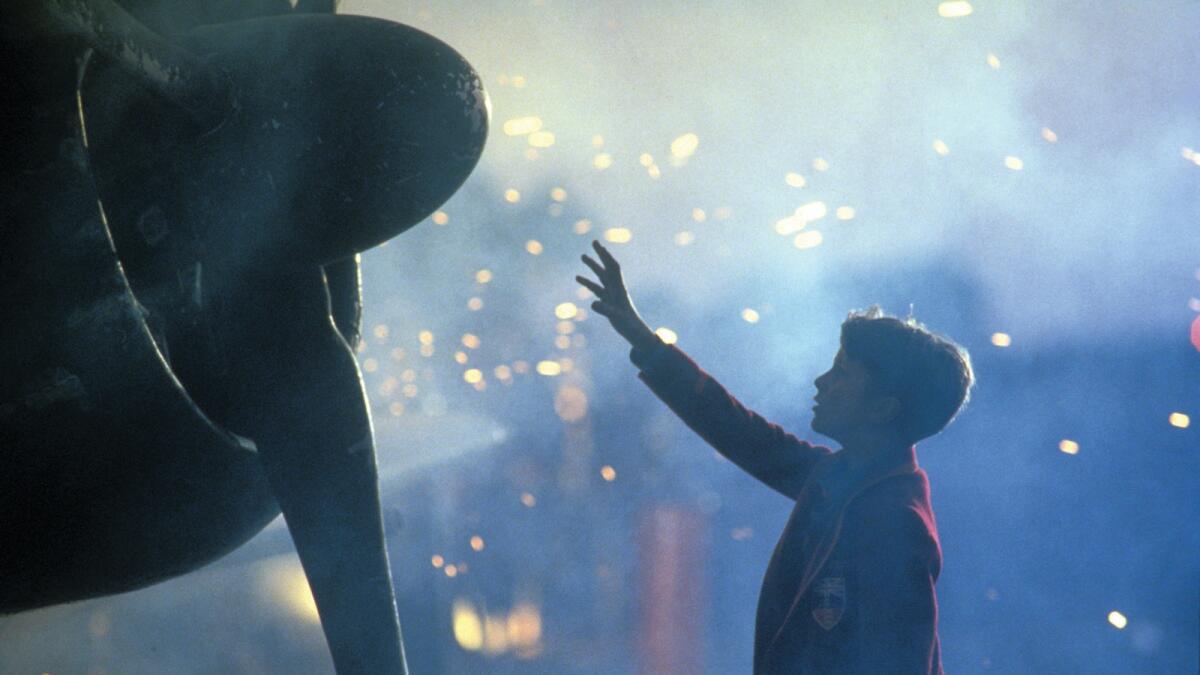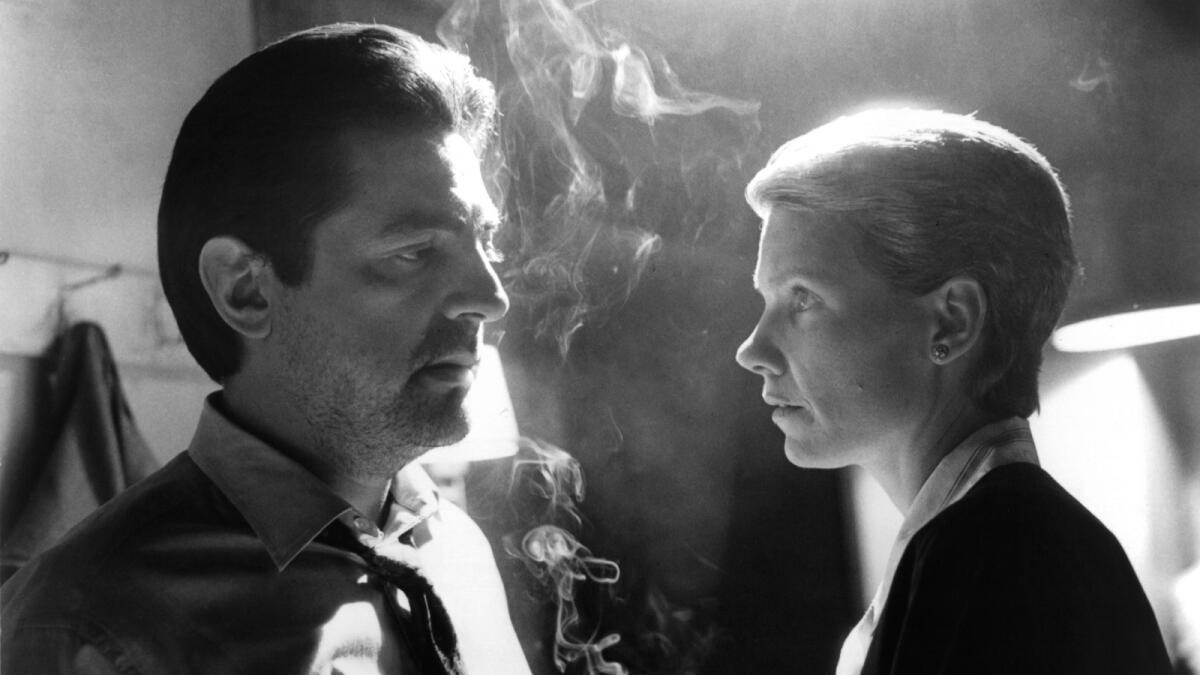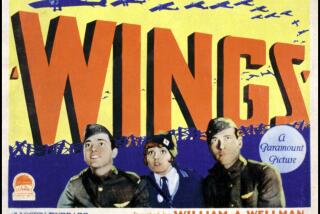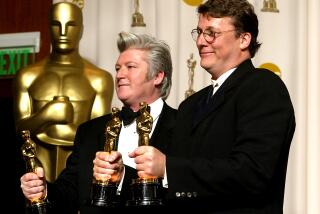1987 revisited: Scribes, World War II through the eyes of babes and Mickey Rourke

It was the ’80s, so the films of 1987 naturally had big stars, big hair and big soundtracks.
The year’s most popular movie, however improbably, was a remake of a French comedy, “Three Men and a Baby,” starring Steve Guttenberg, Tom Selleck and Ted Danson, and directed by Leonard Nimoy. It beat out more star-driven and action fare such as “Beverly Hills Cop II,” “Good Morning, Vietnam,” “The Untouchables,” “Lethal Weapon,” “The Witches of Eastwick,” “Predator” and “RoboCop.”
Bernardo Bertolucci’s “The Last Emperor” took home the best picture Oscar over the James L. Brooks’ media satire “Broadcast News,” starring William Hurt, Holly Hunter and Albert Brooks; the John Patrick Shanley-Norman Jewison romantic comedy “Moonstruck,” with Cher in her Oscar-winning role; and the Glenn Close-Michael Douglas thriller “Fatal Attraction.” Douglas won lead actor for Oliver Stone’s “Wall Street.”
Other films made a lot of noise, as the soundtracks for “Dirty Dancing” and “La Bamba” topped the album charts, while “The Princess Bride” and “Planes, Trains and Automobiles” remain audience favorites 30 years later. Stanley Kubrick’s “Full Metal Jacket,” which netted a single Oscar nomination, now has the most votes on IMDB of any film released in 1987.
But the year might be best remembered for a lot of films that quietly made an impact and still resonate three decades later. From Oscar contenders that failed to rock the vote to smaller movies that we may have forgotten, here is a look at some of the year’s gems.

Game of scribes
It was a fine year for writer-directors.
After establishing himself as one of America’s best playwrights with “American Buffalo” and “Glengarry Glen Ross,” and writing the screenplays for “The Verdict” and “The Untouchables,” David Mamet made his film directing debut with the carefully constructed crime thriller “House of Games.” Starring Joe Mantegna as a slick Seattle con man and Lindsay Crouse as an anxious therapist eager to learn the rules of the trade, the film featured the writer’s trademark staccato dialogue delivered with deadpan aplomb by a slew of Mamet regulars such as Mike Nussbaum, J.T. Walsh, Ricky Jay and William H. Macy in a small role.
With “Matewan,” John Sayles moved from the more intimate scale of his earlier films “The Return of the Secaucus 7,” “Lianna,” “Baby It’s You” and “The Brother From Another Planet” to a sweeping historical tale set against a 1920s West Virginia labor dispute. Starring Chris Cooper, David Strathairn and James Earl Jones, the film beats its social justice drum loudly and harkens back to a time when cinema celebrated the American worker.
Following his breakout 1982 film, “Diner,” Barry Levinson made a string of larger-scales hits, including “The Natural,” “Good Morning, Vietnam” and the Oscar-winning “Rain Man.” In the midst of all that, he found time to return to his native Baltimore for the character-driven “Tin Men,” a loose follow-up to “Diner.” Danny DeVito and Richard Dreyfuss starred as feuding aluminum siding salesman in 1963 Baltimore, and once again Levinson demonstrated his flair for capturing the vernacular of a particular species of American male, effusive about work, food and pop culture, clueless about the women around them.
In “Hollywood Shuffle,” director Robert Townsend and co-writer Keenen Ivory Wayans satirized an industry that hasn’t changed much in the interim with regard to race. Based on his own experience of being deemed “not black enough,” Townsend played a struggling actor who dreams of great roles, only to be offered nothing but slaves, butlers and jive-talking hoodlums.
World War II through the eyes of children
Legendary directors told the story of the war from kids’ point of view.
It’s hard to think of any Steven Spielberg film as being overlooked, but whenever his career is assessed, “Empire of the Sun” seems to get passed over. Based on J.G. Ballard’s autobiographical novel and a screenplay by Tom Stoppard, the film tells the story of a British schoolboy — played by future Batman Christian Bale — separated from his parents during Japan’s invasion of Shanghai during World War II. The loss of innocence, a frequent Spielberg theme, is heartbreakingly rendered, enhanced by a marvelous John Williams score. John Malkovich is quite good as a Dickensian trickster who exploits and befriends the boy.
Similarly, “Radio Days” is often left out of appraisals of Woody Allen’s career, despite it possibly being his most moving film. Narrated by Allen, it’s a quite different view of wartime and the power of the titular medium during the late 1930s and early 1940s as seen through the extended family of a young Woody doppelganger, played by Seth Green. It’s hilarious, but also tender in ways not usually associated with Allen and features a stellar ensemble led by Julie Kavner, Michael Tucker, Dianne Wiest and Josh Mostel, plus cameos by Diane Keaton, Jeff Daniels, Danny Aiello and Tony Roberts.
Louis Malle drew upon his own experience at a Catholic boarding school in occupied France during the Second World War for “Au Revoir les Enfants,” a beautiful and tragic tribute to friendship and bravery in the face of evil. One day, the school’s headmaster, a priest, introduces three new students, Jewish boys he has pledged to hide from the Gestapo. The film’s protagonist, Julien, learns the boys’ secret and bonds with one of them. As the war closes in, the life the boys knew gradually fades, leaving emotional scars that will never heal.
Another autobiographical film about the war, John Boorman’s “Hope and Glory,” detailed the experience of his family in suburban London during the Blitz and garnered five Academy Award nominations, including best picture. Like Allen, Boorman remembers the wonder and excitement of wartime, especially for children, even as German bombs rained down. “Hope and Glory” combined British resolve with sheer lunacy.
Year of the Rourke
It’s hard to accurately describe the heat actor Mickey Rourke generated in the mid-’80s.
After roles in “Heaven’s Gate,” “Body Heat,” “Diner” and “Rumble Fish,” Rourke was in high demand, and he stepped up to leading man status with “Year of the Dragon” and “9½ Weeks.” He was on magazine covers and cultivated an image as a bad boy and seemed on the brink of real stardom. He even opened a newsstand/soda fountain/biker hangout in Beverly Hills called Mickey and Joey’s.
Ruggedly handsome before boxing and surgery took their toll, Rourke had a trio of movies in 1987 that represent the crest of his movie stardom. Seen in order of their release, they’re a kind of Rorschach test on the essence of Rourke. You either see the same stringy haired guy growling his way through the three roles, or you appreciate the full spectrum of Mickeyness on display.
The voodoo noir of “Angel Heart” should have been a great showcase for Rourke allowing him to square off against Robert De Niro’s devilish fop, but most of the pre-release publicity was waylaid by a ratings controversy over the film’s sex scenes, and the displeasure of co-star Lisa Bonet’s TV dad Bill Cosby. Alan Parker wrote and directed “Angel Heart” based on a novel by William Hjortsberg, with Rourke as a New York private eye plunged into his own personal hell while pursuing a case in New Orleans.
“A Prayer for the Dying” features Rourke as a broguing IRA assassin trying to get out. It’s a murky thriller that director Mike Hodges tried to get his name removed from, but it’s a kick watching a ginger-dyed Rourke tangle with British pros Bob Hoskins, Alan Bates and a very young Liam Neeson.
“Barfly” is peak Rourke, with the actor playing alcoholic writer Henry Chinaski, an alter ego for the film’s screenwriter, Charles Bukowski. Directed by Barbet Schroeder, the film follows Chinaski as he drinks his way across East Hollywood’s seamier bars, matched glass for glass by fellow lush Faye Dunaway until a sexy literary patron played by Alice Krige takes an interest in Henry. Rourke fully inhabits the character and the demimonde, bringing a brio and authenticity usually lacking in most cinematic drunks.
Addendum
Some other memorable moments that emerged while compiling this: Jack Nicholson, Meryl Streep (both Oscar-nominated) and Tom Waits on the downward spiral in Hector Babenco and William Kennedy’s bleak “Ironweed”; John Huston’s lyrical direction of the posthumously released adaptation of James Joyce’s “The Dead”; the joyous Cajun-, zydeco-, R&B and gospel-flavored soundtrack of “The Big Easy,” gumbo for the ears; the consummate character actor John Mahoney breaking out (at least for me) in “Tin Men,” “Suspect” and “Moonstruck” and and Hunter delighting in “Raising Arizona,” “Broadcast News” and just about anything that came after; plus two British indies: Emily Lloyd as a cheeky 16-year-old in David Leland’s delightful comedy-drama “Wish You Were Here”; and one of the great cult films of the decade, Bruce Robinson’s savagely witty “Withnail and I” with Richard E. Grant and Paul McCann.
See the most-read stories in Entertainment this hour »
Movie Trailers
More to Read
Only good movies
Get the Indie Focus newsletter, Mark Olsen's weekly guide to the world of cinema.
You may occasionally receive promotional content from the Los Angeles Times.







